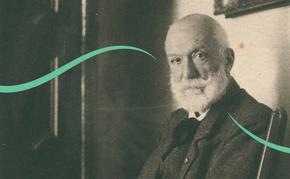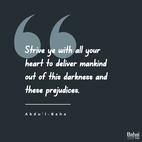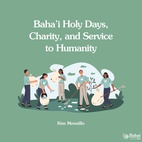The views expressed in our content reflect individual perspectives and do not represent the official views of the Baha'i Faith.
I’ve kept this profound Baha’i quote pinned to my bulletin board and taped to my dresser mirror for over ten years:
Center your thoughts in the Well-Beloved, rather than in your own selves. – Baha’u’llah, Gleanings from the Writings of Baha’u’llah, p. 168.
Sometimes I think I understand what it means, and sometimes I’m not sure.
A few months ago, I lost my job in a layoff, and while unemployed I grew weary of contemplating myself and my situation. So I decided to use my increased free time and my heightened anxiety as an opportunity to turn more towards God—the well-beloved—to see if I can gain a better understanding of this verse and how it can help me cope with this uncertain time.
When I contemplate myself, my thoughts are often scattered, disjointed. Sometimes I wonder when I will work again and panic floods my mind. At other times, I feel giddy with freedom after more than 30 years of continuous employment, and I revel in the possibilities of each new day. Yet at other times, I feel angry with disbelief as I relive the events that brought me to this painful state.

Obviously, my mood is unstable when I think about myself and my future. This is understandable, as I have limited control over my destiny, as we all do.
However, when I contemplate the well-beloved, my creator, I feel more relaxed and grounded. I begin to appreciate this fixed point that I can focus upon, something sure and unshifting that reduces my anxiety.
So, how exactly does one go about focusing her thoughts on God? For a Baha’i, this involves prayer and meditation. The Baha’i teachings recommend that we read and recite the word of God every morning and evening, and I do find that these special times of focused attention lift my spirit and ease my suffering.
Yet after a period of soulful reflection, I often return to a more conventional state in which my thoughts wander over painful territory again.
My goal, of course, is to stay in this prayerful condition as much as possible.
The question that returns to me is this: How can I center myself in God when I can’t really know God?
The Baha’i teachings say that God is unknowable to humankind, and that we must know him through his divine teachers, the prophets that he sends to enlighten us in every age. Yet the prophets are beings above our ken and unknown to us personally. In truth, even our friends and family members—the people we know best—are largely mysterious to us, at least in their inmost reality.
The irony is that while we are seemingly locked inside our own minds, inside our separate beings, we are also intimately connected to God because he has placed within us the image of his own spiritual radiance. We can turn to this higher aspect of our nature and find the Creator dwelling within us:
Turn your faces away from the contemplation of your own finite selves and fix your eyes upon the everlasting radiance. – Abdu’l Baha, Paris Talks, p. 167.
I believe that the first step to accessing our higher nature involves reading and studying the word of God—the scripture of any of the world’s religions. Then the second step is to remain open to its transformative, healing influence.
For me, present-moment living has become a very effective tool in this process. In the present moment, I find it easier to open my heart to love and healing. If I leave the moment, my mind begins to wander into thoughts about the past and the future, and I start to worry and fret about all kinds of things.
Focusing on my body and breath as I move through my day helps me stay in the moment. This common form of meditation can be practiced any time, whether washing dishes, working, or talking with a loved one:
Body awareness keeps you present. It anchors you in the now. – Eckhart Tolle
Body awareness opens the spirit to the placeless. The body is God’s gift to us, which links our physical and spiritual natures. If we listen quietly and feel the body from within, we can tap into a wisdom beyond our own finite concerns and limitations. Then we can feel the rush of spirit that takes us beyond our selves and lets us feel the influence of God’s holy presence in each moment of our lives.
This is my goal: to study the word of God, to recite the prayers and contemplate the teachings of the holy messengers, and then to stay in the present, grounded in the reality of each moment as the spirit moves within me.
As I increase this practice, I watch the storms of tests and uncertainties move over the surface of my life, yet my deep spiritual core remains undisturbed as I make God the center of my world:
Man must so live that he may become beloved in the sight of God, beloved in the estimation of the righteous ones and beloved and praised by the people. When he reaches this station the feast of eternal happiness is spread before him. His heart is serene and composed because he finds himself accepted at the threshold of His Highness, the One. His soul is in the utmost felicity and bliss even if he be surrounded by mountains of tests and difficulties. He will be like unto a sea on the surface of which one may see huge white waves, but in its deeps it is calm, unruffled and undisturbed. – Abdu’l-Baha, Star of the West, Volume 7, p. 101.

















Comments
Sign in or create an account
Continue with Facebookor